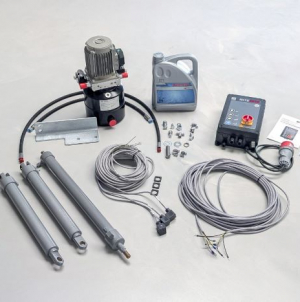-
Rite-Hite unveils new range of hydraulic kits to upgrade and extend dock leveller performance - 1 day ago
-
REWE and Cimcorp automate fresh supply chain for Berlin supermarkets and stores - 1 day ago
-
Q1 – A recovery period or time to fix, switch and scale? - 1 day ago
-
NULOGY’S SHOP FLOOR SOFTWARE TO POWER COMPLETE CO-PACKING’SOPERATIONS - February 13, 2026
-
Why lead generation depends upon good content - February 13, 2026
-
Wallapop and Albatross Sign Strategic Partnership to Bring Real-Time AI Discovery to the Future of Consumer-to-Consumer Commerce - February 12, 2026
-
Thorworld ramp helps Hubergroup to streamline its unloading operation - February 6, 2026
-
TRACKER INNOVATION FROM QUECLINK TO BOOST STOLEN VEHICLE RECOVERY PERFORMANCE - February 4, 2026
-
Flexi Narrow Aisle hits 50! - January 29, 2026
-
DERRY BROS ATTRACTS RECORD NUMBERS OF FREIGHT CUSTOMERS SEEKING CUSTOMS SUPPORT - January 29, 2026
Driving apprenticeships: A question of integrity.
APPRENTICESHIPS will be an even more relevant and plausible path to career success in the transport and logistics sector as the Apprenticeship Levy unfolds, says David Cormack, strategic account director at System Group, providing advantages for those sufficiently adroit to see a bigger picture.
Coverage in the national press has undoubtedly highlighted concerns about the Apprenticeship Levy, with many bemoaning its arrival. However, while there will always be those who continue to harbour reservations, the deal’s done and the Levy’s here to stay. The chance is now there for those employers seeking training partners who operate with integrity, transparency and probity, to seize the opportunities and move forward into a new training and skills landscape, which, in equal measure, offers both challenge and reward.
Surely, it’s not unreasonable to suggest that a key issue is our own cultural bias towards traditional routes into professions, together with a view that apprenticeships are for those who are perhaps less scholastically able, while for those who are more academically motivated, the way forward must be university before starting a career. For years, apprenticeships have been stigmatised – the perceived option for those who have limited ambition, or are simply low achievers – but the work of the Trailblazer scheme among other initiatives has done much to raise awareness, changing the way apprenticeships are seen.
The Levy is an opportunity for transport and logistics’ employers to invest more ownership than previously held in their own apprenticeship schemes, integrating training with new skills development across whole swathes of operations, while embedding new blood deeper than ever before in a business’s culture, ideology and corporate identity.
At a basic level, an apprenticeship is simply a combination of paid work and off-the-job study, which can deliver the skills employers want from their workforces together with professionally recognised qualifications. If utilising apprenticeships allows people to find a route into a career at all levels that isn’t otherwise available to them, why shouldn’t we look to create these opportunities while applying the same vigour in the pursuit of quality education as we would through other routes?
If it helps to develop and retain the high levels of skills UK transport and logistic companies require to remain competitive and move forward, particularly in regions where there is plenty of potential waiting to be unleashed, this is something we must encourage and support. If it helps businesses of all sizes to up-skill their existing workforce, by maintaining their employment, while allowing time for study towards higher-level qualifications, surely this must be a positive outcome, too?
I’m heartened by both the scope and volume of conversations that my colleagues in the industry are having about apprenticeships – we owe people a beneficial route into our profession. The apprenticeship reforms have created exciting possibilities for individuals to access – in some instances, for the first time – opportunities in new sectors, at new skill levels and in some professions, that are otherwise the preserve of a traditional cohort of typically graduate learners.
The Government’s commitment to dealing with the national skills shortage by opening three million more apprenticeships has to be seen as a welcome move but it has to be paid for. The Levy is set to drive an increase in both the scope and quality of the training undertaken by employers. By turns, it will boost volume, creating opportunity for training providers who combine integrity and experience to deliver the requisite support, helping employers navigate issues of cost while simultaneously opening their eyes to the benefits of training and how a well-equipped, highly skilled and motivated workforce delivers a competitive, cutting edge.
While employers will focus on the use of those apprenticeships and occupations that have most benefit, there’s no suggestion that the outcome achieved by someone working towards a professional occupation in the transport and logistics sector via an apprenticeship should be considered anything other than equal to those who have pursued other paths. Indeed, in many ways the apprenticeship provides far more: a highly competent, accomplished and work ready employee from the moment they finish training.
The Institute for Apprenticeships (IfA) has to also warrant a mention. This new body, set-up last November, is a further welcome move that will raise standards, setting the tone for the high quality of apprenticeships in England. It offers an employer-led approach to apprenticeship reform in England – ensuring that employers can drive the content and quality of apprenticeships in a way that will deliver the skilled workforce industry needs to prosper.
So, if you are looking to choose a training partner for your organisation, check that are registered on the Skills Funding Agencies’ Register of Approved Training Providers (RoATP). If not, they cannot deliver your apprenticeship programmes through the Levy scheme. Ensure also that they possess the necessary accreditations to deliver the courses specific to your organisation.
Make sure that they’re specialists in your sector. This will ensure that they understand your business and design and deliver apprenticeships that meet your needs – after all, you need an organisation that not only understands the logistics of your business, but the culture, the personality and the meaning of what it is to be a member of your organisation.
Ofsted is of course an important barometer to consider. Utilising the services of a training provider who is at least ‘Good’ offers reassurance that quality is to the fore and that services meet industry needs.
David Cormack is strategic account director at System Group, which works with logistics and transport companies, military and government departments, local authorities, national corporations and small businesses as well as individuals and the self-employed. The company also offers a wide range of qualifications from management and leadership through driver licence acquisition through to outsourced learning and development Levy management solutions. More at www.system-group.com

































